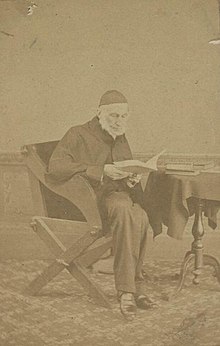Isaac Williams (writer)
This article needs additional citations for verification. (August 2019) |

The Reverend Isaac Williams (1802–1865) was a prominent member of the Oxford Movement (or "Tractarians"), a student and disciple of John Keble and, like the other members of the movement, associated with Oxford University. A prolific writer, Williams wrote poetry and prose including the well known Tract: "On Reserve in Communicating Religious Knowledge".
Life
Williams was the son of a Welsh Chancery barrister who spent much of his time in London. The Williams family had a home, Cwmcynfelin, in Llangorwen, Cardiganshire, from which Isaac would walk to Oxford and other destinations. He is associated with the establishment there of a distinct parish separated from that of Llanbadarn Fawr. He was educated at Harrow School and Trinity College, Oxford, where as an undergraduate he gained the Latin verse prize and thus came to the notice of John Keble.
In 1829 he was ordained as curate of
In 1841, he was suggested as John Keble's successor as the
In 1842 Williams married Caroline Champernowne and the couple moved to Bisley, Gloucestershire, where he worked as a curate to Thomas Keble. In 1846 he became seriously ill and, although he recovered, he was left practically incapacitated and unable to continue active work in the parish. He therefore moved to Stinchcombe, Gloucestershire, where his brother-in-law, Sir George Prevost, a fellow Tractarian, was the vicar. He lived there until his death in 1865.
Writings
- The Cathedral, or, The Catholic and Apostolic Church in England. (Oxford : John Henry Parker, 1838)
- The Baptistery, or the way of eternal life / by the author of "The cathedral." (Oxford : J.H. Parker ; London : Rivingtons, 1842-1844)
References
- ^ Chadwick, Owen, The Victorian Church, Vol 1, Oxford: Oxford, 1966.
External links
This article incorporates text from a publication now in the public domain: Wood, James, ed. (1907). The Nuttall Encyclopædia. London and New York: Frederick Warne. {{cite encyclopedia}}: Missing or empty |title= (help)
